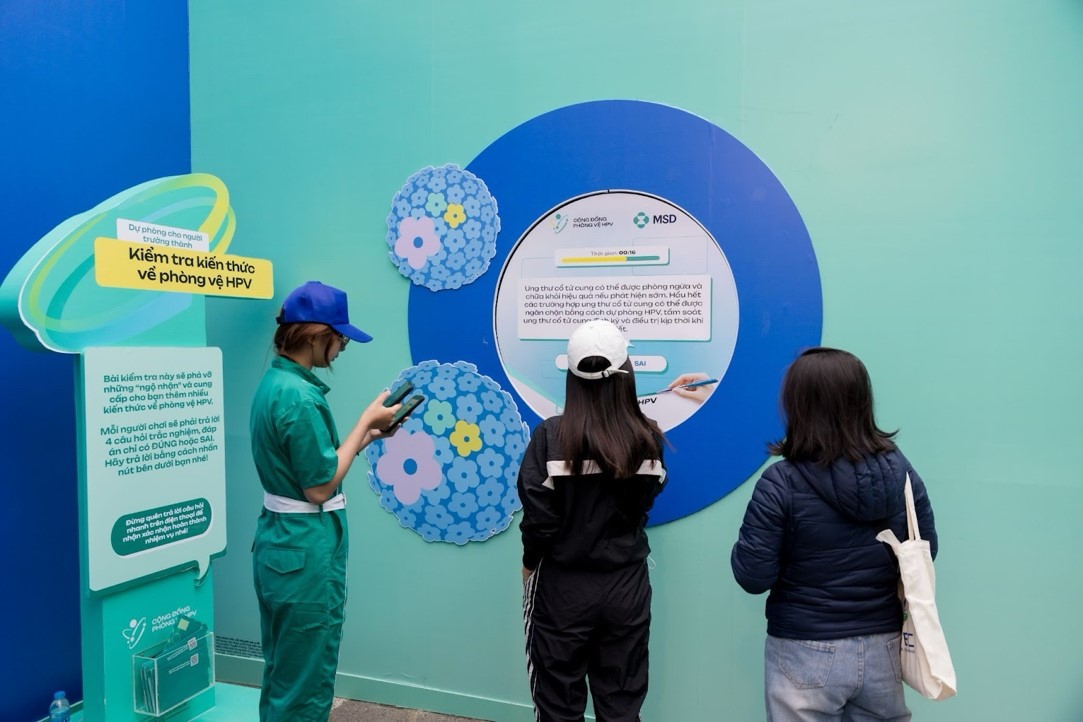Launched nearly 4 months ago by the Ministry of Health, in partnership with MSD Vietnam, the “For a Vietnam free from the burden of HPV” campaign has conducted a series of community activities in several provinces. One highlight is a community exhibition using AI technology to provide interactive experiences, helping people learn about HPV, prevention methods, and the importance of vaccination.
The campaign focuses on providing accurate scientific information through community health education programs across the country. Its core goals are expanding reach, strengthening connections between healthcare organizations and government agencies to implement synchronized communication solutions, and raising public awareness of HPV, HPV-related diseases and cancers – especially cervical cancer – and preventive measures.
 |
Activities at the exhibition within the campaign. Photo: Huynh Nhu |
HPV (Human Papillomavirus) can lead to serious conditions like cervical, anal, vaginal, and vulvar cancers, as well as genital warts in both men and women. According to Globocan 2022 data, Vietnam records approximately 6,200 HPV-related cancer cases annually, with over 2,500 women dying from cervical cancer. Without effective intervention, this number could reach 200,000 by 2070, highlighting the urgency of widespread communication and effective prevention.
The campaign hosted a series of scientific workshops, bringing together thousands of healthcare professionals and speakers from various specialties, including preventive medicine, obstetrics and gynecology, pediatrics, dermatology, and oncology. Participants represented associations, research institutes, and leading domestic and international hospitals, including the National Institute of Hygiene and Epidemiology and the Pasteur Institute in Ho Chi Minh City.
Professor Phan Trong Lan, Director of the National Institute of Hygiene and Epidemiology, emphasized the need for collective efforts to raise awareness and promote HPV prevention. He stated that the HPV vaccine represents a revolutionary achievement in preventive medicine, providing a powerful tool to prevent HPV-related cancers at their root. This confidence stems from rigorous multinational clinical trials, the gold standard in medicine. After nearly 20 years of global use, the real-world effectiveness of the vaccine is evident. Reputable scientific reports have documented significant reductions in HPV-related diseases in areas with high vaccination rates. Professor Lan stressed the importance of proactive healthcare through regular screenings, maintaining a healthy lifestyle, and embracing modern medical advancements.
 |
The community exhibition uses AI technology to provide interactive experiences, helping people learn about HPV, prevention methods, and the role of vaccination, as part of the "For a Vietnam free from the burden of HPV" campaign. Photo: Huynh Nhu |
Associate Professor Nguyen Vu Trung, Director of the Pasteur Institute Ho Chi Minh City, noted that the HPV vaccine has been implemented in 194 countries and incorporated into national immunization programs in many, including 9 Southeast Asian nations. Vaccine coverage ranges from 42% to 86% in developed countries like the US, Canada, and the European Union. As of 2023, 6 HPV vaccines are available globally.
In Vietnam, under the roadmap to increase the number of vaccines in the expanded immunization program for 2021-2030, the HPV vaccine is among 4 new vaccines slated for inclusion.
Diep Chi












